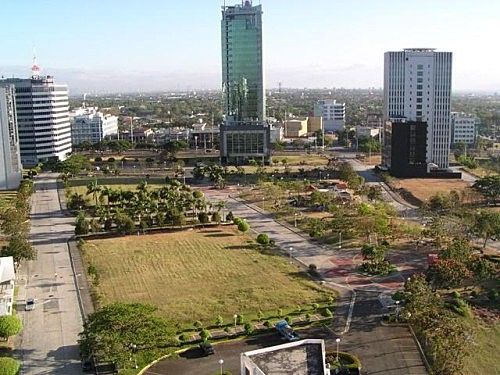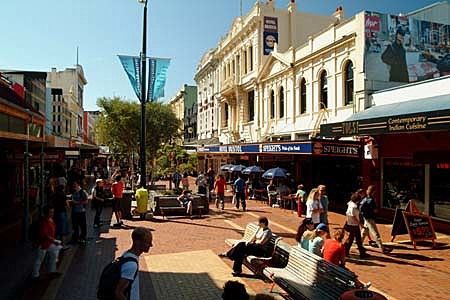Creative Outsourcing: iSentia, Wellington and the Grim and Fateful Pattern
Like so many young Wellingtonians, Di White's first office job was as a media monitor. But now, as iSentia prepare to relocate jobs to the Philippines, she finds they're not so open about their push to cut down on costs, and wonders what it means for the city's young creatives.
Few workplaces are as ubiquitous amongst 20-something Wellington liberal arts graduates as iSentia. The company, until recently known as Media Monitors, has been everything from a meal ticket for struggling creatives to a foot in the door for under-graduates looking for ‘real world’ work experience. An Australian company that monitors news media content from both New Zealand and Australia and provides a range of government and corporate clients with ‘media intelligence’, iSentia opened its Wellington office in 2004. Since then, the Wellington office has grown to a staff of over 100, many of whom are hired on a part-time basis – be it as students or creatives looking for a steady income on the side.
My role as a broadcast monitor at the company was my first ‘real’ job – a job where after years of waitressing, nannying, and even an exhausting and panic-stricken role trying not to get into debt as a Christmas Cookie Time Seller, I would finally get my own email address and the use of a bad coffee machine. I was starting my fourth year of law, and painfully aware that in my bull-headed refusal to apply for any corporate law firm internships, I needed some kind of office experience if I was going to have any hope finding a job after graduation. The hours were flexible, the work enjoyable, and there were plenty of cool musicians and writers to chat to while making bad coffee. For me, it ticked all the boxes.
So it gave me a pang of nostalgia to speak to Evan*, an employee at Wellington’s iSentia office for a number of years. Like me, he spent months of his life listening to foaming talkback hosts as part of the Australian broadcast team, and it’s allowed him the financial stability to pursue his creative career. “Some broadcast monitors are just people who have good writing skills and it’s a job that suits their lifestyle,” he explains. “Other people use it to support their other endeavours: a lot of bloggers, reviewers, musicians, actors, writers, and jewellery makers – a lot of creative industry. I think it’s also a job people take on to bridge between that hospo-retail gap and whatever professional lifestyle they might be going into next.”
But in late August, iSentia announced to its Wellington staff that it would be moving part of its Australian broadcast monitoring team from Wellington to the Philippines. Around 50 positions were to be outsourced through a NZ-founded company, Velocity Made Good (VMG). iSentia has told staff that it is allowing for a six month period of attrition, hoping the 50 positions will essentially disestablish themselves.
“There’s been restructuring a few times across the course of my employment but it’s never affected my office as directly as this, and never on this kind of scale,” Evan says. “They’ve said they hope to avoid redundancies but that doesn’t make much sense to me considering the reduction in team size they are hoping for.”
Whether or not current staff are made redundant or leave knowing redundancy is imminent, the issue remains: another Wellington office – one that has long provided a stepping stone and stable income for graduates, and a steady pay cheque that essentially subsidises the Wellington arts scene – has opted to outsource its labour and move jobs offshore.
Patrick Baume, iSentia’s Group Communications Manager, told me there were three main reasons why iSentia chose to shift the broadcast monitoring roles to Manila: “There’s the separation of risk from two centres to three; there’s the time zone advantage of having one centre that’s two hours ahead of East Coast Australia and another that is two hours behind, it gives a pretty wide gap of normal operating hours. There are of course cost efficiencies as well, there’s no doubt about that. It was a range of factors, but each of those three were fairly important.”
However, the importance of the first two reasons seems somewhat overstated. “I feel like they couched the obvious cost-saving motivation by talking about a few other reasons,” Evan admitted. While running the company out of three rather than two centres would indeed have advantages, especially given that 2013 was particularly shaky year in Wellington, and different time zones could allow for wider operating hours, both of these could have been achieved by expanding, for example, iSentia’s Perth office – thousands of kilometres from the East Coast of Australia, in the same time zone as Manila, with staff who know the lay of the land. After all, as Evan points out, Manila is not exactly a natural-disaster-free zone.
Instead, it’s clear cost saving was the major imperative. There’s a reason Manila was recently named the number two “outsourcing destination” in the world, second only to Bangalore, India: low wages. The minimum wage in the Philippines ranges from P213—P466 (Philippine Peso) per day (it differs by region) – which converts to between around $NZ6.00 and $13.00 per day. A recent classified on Filipino jobs site Jobs DB suggests that VMG will be basing media monitoring operations in the National Capital Region, where base daily rates edge closest to what an NZ minimum wage worker might receive in an hour. Baume says the company is not aware of how much broadcast monitors in Manila will be paid. “I don’t think we’d be discussing individual wages or contracts with our provider,” he says.
It’s the uncomfortable reality of outsourcing labour to third parties in countries like the Philippines or India. New Zealand and Australian companies wash their hands by outsourcing the work rather than setting up an offshore office, and distance themselves – and their brands – from poor wage and working conditions (with some exceptions). While the company may not know how much the Filipinos doing the work once done by Wellington monitors will make, they know one thing: it’s helping their bottom line.*
It would be easy to dismiss this as another instance of corporate outsourcing, albeit one that will hit the creative sector in a small, unique city particularly hard, but concerns were raised that something more disingenuous lay beneath the PR speak. From working at the Wellington office, Evan was first told that the Filipino staff would be given anglicised names, and the summaries they produce will be tagged as either “M” or “W” – Melbourne or Wellington. “I don’t think [iSentia] want their clients to know that a country where English is not the people’s first language is summarising media reports for them,” Evan says. “I think it’s really underhanded and it concerns me. If they stand by this decision from a production point of view – if they think clients are still being delivered the same service – then why wouldn’t they be more open?”
Baume rejected that the Filipino staff will be given anglicised names, saying this “sounds like something that’s been through the chain and then come out a bit strange at the other end”. A week after I spoke to Baume, Evan and the Wellington office received new information and came back to me: the company would no longer be requiring that Filipino staff use anglicised names, and summaries produced in the Philippines would be recorded as such.
The sudden turn-around – especially given that Wellington staff had already expressed discomfort about these changes – suggests iSentia was eager for the changes to quietly slip under the radar. Baume confirmed that the company will not be informing its clients of the fact broadcast monitoring work is being outsourced to the Philippines. “There is no change to the service being provided to clients, so there’s no need to send a client communication. We generally would advise clients about changes to products or platforms or client servicing arrangements, but not about operational changes that do not change any products or services.”
Whether or not iSentia views this as an “operational change”, its clients are likely to be interested in where iSentia’s core product is being produced. The function of a broadcast monitor is to listen, summarise and paraphrase news content. The summary is then sent to clients with an interest in subject of the broadcast. For example, a news bulletin about the impact of dairy on waterways would perhaps prospect the Ministry of Environment, Federated Farmers, and the Parliamentary Commissioner for the Environment (for starters). The role of a broadcast monitor is to accurately summarise the broadcast and to ensure all key words are noted so it prospects to a wide range of clients.
It’s a role that’s fundamentally about strong English language skills, says Evan. New Zealand monitors already have issues dealing with Australian accents and place names (try picking up place names like Ozenkadnook or Woolloomooloo when pronounced in a thick Aussie drawl), and it’s reasonable to assume staff with English as a second language will struggle even more. Baume claims the company has done “the proper governance around ensuring the content is of a high standard”, but there’s no question that if strong English skills and the quality of its product were iSentia’s primary concerns, it would not move production from an office of liberal arts graduates in Wellington to a place where English is not the dominant language.
Comprehension concerns aside, clients may have an interest in iSentia’s production model for other reasons. In both New Zealand and Australia, government departments and agencies are some of iSentia’s most lucrative clients. It’s a sad irony that government agencies with the purpose of fuelling job creation and economic growth – for example, New Zealand’s Ministry for Business, Innovation, and Employment or Australia’s Department of Employment – are likely to be paying for a service that contributes to the very job losses and outsourcing they’re meant to exist to counter.*
For the 50 or so Wellington broadcast monitors contemplating their next steps, the fact there is no right to redundancy pay in New Zealand adds insult to the injury. In 2009, when the Wellington office’s Sydney counterpart moved a number of monitor positions to Wellington, outgoing staff each received a number of weeks’ severance as a statutory entitlement. It seems unlikely those facing redundancy in six months’ time will be afforded the same treatment. Baume says whether staff will receive redundancy payouts is “a decision that will have to be made at the time, and following all of the local laws and procedures around that”, but given New Zealand laws do not mandate redundancy pay, the likelihood of reducing support seems slim. And so a grim, fateful pattern emerges – undoubtedly, New Zealand’s weak redundancy laws wouldn’t have gone unnoticed when the decision to shift Australian roles across the Tasman was being evaluated.
It’s hard to predict what impact the job losses will have on the Wellington creative scene. For many people in this space, and over many years, iSentia has been a place for creative 20-somethings to go and figure things out – to finish their Arts degrees, to write a play, to make time to make music, to manage between acting jobs. The company affords its employees a degree of flexibility, something of intrinsic value to a city’s artistic community. If jobs like this do not exist, some creatives will go somewhere where they can manage, and they grow their creative careers there. Alternatively, they give it up for the 9—5 grind and wonder what could’ve been. Worse still, they can’t subsidise their practice, but they also can’t find anything else in the way of a job.
Evan sees the job losses as having a real and tangible impact on the small, change-sensitive Wellington arts scene – already rattled by the loss of patronage and attendance that came with public sector cuts. “I think it puts people who are already at risk of unemployment even more so. That probably sounds a bit drastic but there are people who find it hard to find a job that supports them in such a way that they can keep doing what they like.”*
Regardless of the somewhat unique nature of the company (read: I worked there, if you are reading this you probably know people who have worked there, somewhat famous people who are now doing great things as actors, writers, or performers have worked there), the issue of outsourcing is far bigger than one company, and far bigger than just New Zealand. Countries like the Philippines promote themselves as ‘outsourcing destinations’. In the Philippines alone, the ‘booming outsourcing industry’ employs over one million people, and is on track to keep growing rapidly. That means in the Philippines, one million people are doing the jobs once done in countries like New Zealand and Australia for a pittance of the cost and with few – if any – of the legislative safeguards countries like ours afford.
And it is an outsourcing ‘industry’ – not the Philippines’ own plucky homegrown advantage. Both in the Philippines and abroad, outsourcing specialists reap enormous profits. According to recent figures, the 36 biggest outsourcing firms made a combined profit of P192 billion ($NZ5.49 billion) in 2012 alone. These outsourcing firms act as ‘middle men’ between companies like iSentia – companies that say they know nothing about the wage conditions of the workers, that they have no idea how people get treated on the ground – and the workers themselves. This means Western companies keep their hands clean and multinational outsourcing specialists run out of places like Dublin and Ohio and Silicon Valley turn over massive profits, all while workers are reduced to the commodity of ‘cost-competitive labour’.
The BPO (Business Process Outsourcing) sector, as it’s commonly known, is set to continue in its rapid growth, posing tough questions for governments in countries like New Zealand. Should companies be able to exploit cheap labour in impoverished parts of the world, while simultaneously destroying the local job market and creating a false economy in terms of what it cost to produce a good or service?
To date, New Zealand has not legislated to restrict or regulate outsourcing. Back in 2010, Prime Minister John Key came out and said that outsourcing call centre work is “wrong”, but nothing followed to suggest Key was intent on regulating the practice. Indeed, objections to offshore call centres often amount to little more than thinly-veiled racism (“I want to talk to someone down the road, not across the bloody Indian Ocean!”). However, as more companies like iSentia pack up shop and gravitate to the source of cheap overseas labour, countries like New Zealand and Australia may need to confront the impact of outsourcing on their own job markets.
This, however, seems unlikely. The loss of a few local jobs will be of little concern to those running large companies – banks, accountancy firms, telecommunication companies – when its their bottom line benefiting. A government seeking to regulate outsourcing is likely to face some wealthy – and influential –opposition. Comprehensive solutions have remained in the academic realm, and while some state governments in Australia have added restrictions on outsourcing as part of their procurement policies, this hasn’t translated to federal action.
But one significant niggle can’t be affected by regulation or a lack of it. Companies looking to outsource part of their production are going to face brand damage. As long as people are talking about outsourcing, its impacts on local jobs, and how it is “wrong” (in the ever-eloquent words of John Key) that people are being paid meagre amounts to do the same work that we ourselves have done, companies will be more reticent when it comes to outsourcing. Protests attract attention, attention raises questions, and, in this context, questions are bad. It’s enough to make you think twice about letting your clients know what you’re doing, or briefly consider making it look like work haven’t been outsourced at all.
Indeed, it might just be that the only thing stronger than the all mighty dollar is the fear that people will see through the gobbledygook and corporate jargon about “cost efficiencies” and “mitigation of risk” and call outsourcing in the developing world for what it is: exploitation. And at that point, they’ll demand solutions to deal with it in greater numbers – and our current politicians, or if not, the political systems themselves, will be forced to respond.
*Evan's name has been changed to protect his identity.




